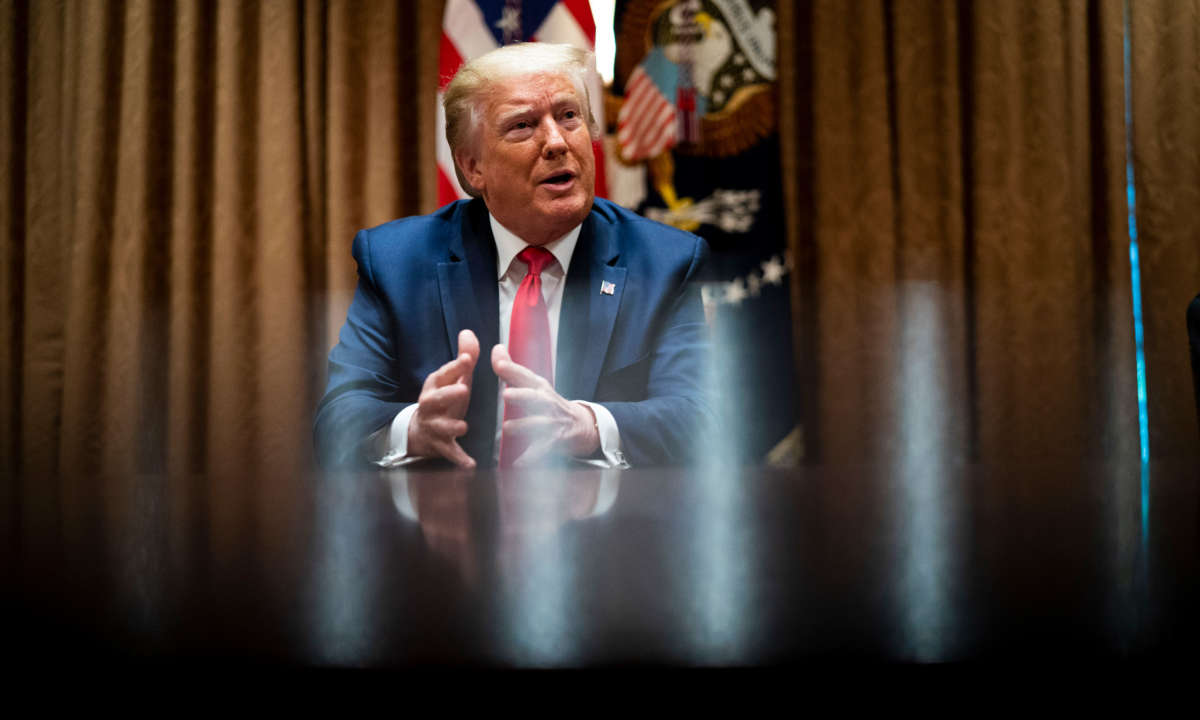President Donald Trump announced on Wednesday on social media that he would not engage in any discussions on renaming military bases that bear the names of Confederate generals.
The debate on removing Confederate names, symbols and monuments has been renewed in recent weeks, following a string of uprisings in cities across the U.S. after a white Minneapolis police officer killed George Floyd, a Black man, in May.
Protesters across the country have removed monuments of Confederate generals and leaders on their own, including in Richmond, Virginia, where a statue of Jefferson Davis was torn down this week.
Some organizations, such as NASCAR, have announced a ban on displaying the Confederate battle flag during their events.
Branches of the U.S. Armed Forces have adopted similar restrictions, with both the Marines and the Navy announcing within the last week that they would no longer tolerate the presence of the Confederate flag.
On Monday, Army Secretary Ryan McCarthy and Defense Secretary Mark Esper also said they were open to changing names of 10 Army installations that have been named after Confederate generals. That suggestion appeared to go too far for Trump, who responded on Twitter Wednesday that he wouldn’t allow such name changes to happen under his watch.
“The United States of America trained and deployed our HEROES on these Hallowed Grounds, and won two World Wars. Therefore, my Administration will not even consider the renaming of these Magnificent and Fabled Military Installations,” Trump wrote in a series of tweets. “Our history as the Greatest Nation in the World will not be tampered with. Respect our Military!”
Echoing Trump’s suggestion that changing the names of these bases would be an affront to soldiers who died in battle, Press Secretary Kayleigh McEnany on Wednesday also denounced the possibility raised by Army officials earlier in the week.
“To suggest that these forts were somehow inherently racist and their names need to be changed is a complete disrespect to the men and women who the last bit of American land they saw before they went overseas and lost their lives were these forts,” she said.
On Thursday, Trump tweeted out a statement that suggests he opposes removals of Confederate symbols in a more general sense. “THOSE THAT DENY THEIR HISTORY ARE DOOMED TO REPEAT IT,” he wrote, using all capital letters in his tweet.
The refusal to budge on the issue from the White House, however, took military leaders by surprise. One unnamed official, speaking to Politico, said it was “hurtful” that moves to reconcile the country’s history (in originally glamorizing Confederate leaders and now attempting to remove memorials to them) were being met with such hostility, without the president even being open to discussion.
“It feels like we took two steps forward and six steps back. Just to have a conversation, that’s all we wanted,” the official said.
White House officials were reportedly unaware of Trump’s plan to stand in the way of such changes in such a steadfast way. According to Politico, they had understood that the president was, in a general sense, opposed to the idea, but didn’t realize he was planning to make a public statement as he did on Wednesday.
As Porshéa Patterson wrote for Truthout in 2018, “Monuments and other landmarks that memorialize Confederate leaders reinforce the trauma Black people face and the understanding that the US legal system is built to sustain the rights of people who side with the Confederacy over Black lives.”
“Nothing better exemplifies the United States’ tenuous relationship with its history than Confederate monuments and the number of streets, bridges and schools that still bear the names of racist leaders throughout the nation,” Patterson wrote.
Join us in defending the truth before it’s too late
The future of independent journalism is uncertain, and the consequences of losing it are too grave to ignore. To ensure Truthout remains safe, strong, and free, we need to raise $43,000 in the next 6 days. Every dollar raised goes directly toward the costs of producing news you can trust.
Please give what you can — because by supporting us with a tax-deductible donation, you’re not just preserving a source of news, you’re helping to safeguard what’s left of our democracy.
